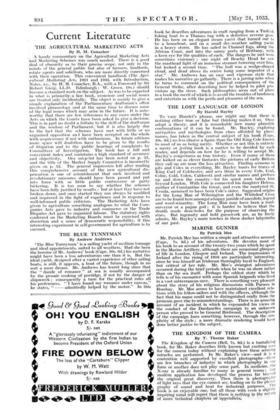Current Literature
THE AGRICULTURAL MARKETING ACTS By H. M. Conacher
, A handy commentary on the' Agricultural Marketing Acts And Marketing Schemes Was much needed. There is a good 'deal of obscurity as- to their Precise scope, not only in the 'minds of the general .public but also of farmers, landlords,
estate agents and who are more directly concerned with their operation. This convenient handbook (The Agri- cultural Marketing' Acts, 1931 and 1933, with Introduction, Notes, (c., by H. M. Conacher, B.A., with a Foreword by Sir Robert Greig, LL.D. Edinburgh : W. Green, 10s.) should become a standard work on-the subject. As was to be expected in what is priniarilyi.a law- book, economic and social issues are treated only incidentally. The object is mainly to give a 'simple explanation of the Parliamentary draftsman's often involved phraseology and at the. same time to discuss some of the legal issues which may arise in the future. It is note- worthy that there are few references to any cases under the Acts on which the Courts have been asked to give a decision. This is in part no doubt a tribute to the skill of the draftsman and the wigdorri of Parliament,- but it is also largely due to the fact that the schemes have met with little or no :organized opposition aril have been accepted on the whole with acquiescence if not with enthusiasm. In future editions more space will doubtless have to be given to the results of litigation and to the public hearings of complaints by Committees of Investigation. The book has a full and convenient index and maintains a high standard of accuracy and objectivity. One misprint has been noted on p. 31, 'and the title of the Market Supply Committee is incorrectly given on p. 32. The general impression left after reading this comprehensive account of the new agricultural dis- pensation is one of astonishment that such involved and ;revolutionary measures should, have been passed and put into force with so little public controversy or party bickering. It is too soon to say whether the schemes have been fully justified by results ; but at least they have not
• .broken down, and once started-they can always be modified and improved in the light of -experience and in response to well-informed public criticism. The Marketing Acts have given to agriculture something analogous to what the Com- panies Acts gave to industry and commerce or the Trade Disputes Act gave to organized labour. The statutory rights conferred on the Marketing Boards must be exercised with discretion and a sense of democratic responsibility, if this interesting experiment in self-government for agriculture is to succeed.














































 Previous page
Previous page